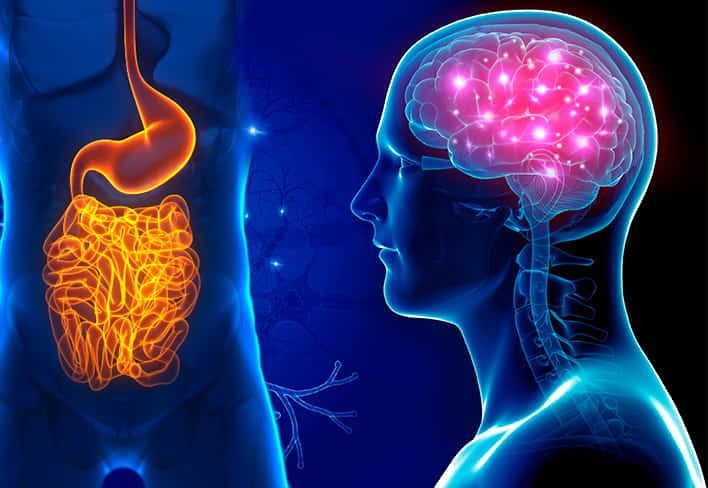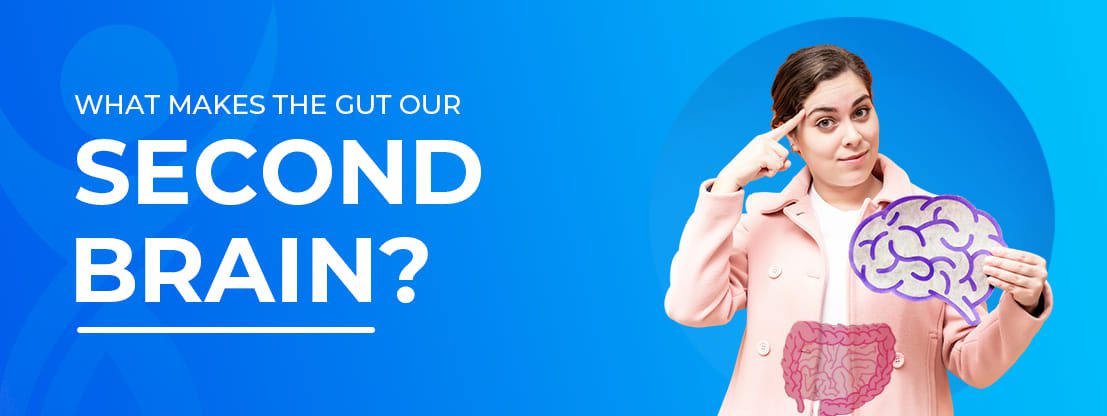You don’t need to be an expert in human anatomy to know that there is a close link between the brain and the gut. The feeling of “butterflies” in our stomach when we prepare to give a presentation, stress-induced stomach ulcers, emotional eating, and even our intuition showing up in the form of a “gut feeling” – all point to the fact that the brain and gut are constantly talking to each other.
The gut-brain axis appears to be one of our body’s most significant connections, according to newly available research.
The Nervous System in our Gut
The gut comes with its very own nervous system thus earning its nickname of “second brain.” Known as the enteric nervous system, this network of nerve cells or neurons is made up of two thin layers of cells which contain over 100 million nerve cells, more than the peripheral nervous system or the spinal cord. They line your GI tract all the way from the esophagus to the rectum.
In addition to the high number of neurons, another way in which the gut resembles the brain is that the neural tissue in the gut produces more than 30 different neurotransmitters. Neurotransmitters essentially act as chemical messengers in relation to functions that are performed by the brain. The gut makes over 95% of serotonin or the “happy chemical” which plays a key role in stabilising moods.
Gut-Brain Communication
The gut and the brain communicate through a thick cable of neurons that connects the gut and the base of the brain. Together, they form the vagus nerve, the longest cranial nerve in our body. This nerve functions as a path through which the gut and the brain send messages to each other within a few milliseconds.
Another way in which these two important organs communicate is through the gut microbiome. The trillions of microbes that live in our gut collectively are known as the gut microbiota. Collectively, they form a complex ecosystem that comprises 100,000 times more microbes than the total global population of human beings

The microbes in the gut microbiome reside primarily in the mucus layer that lines the intestines, in close proximity to the neurons and immune cells, which serve as the main information gathering systems of our bodies. They are in prime position to sense signals from the brain regarding stress, anxiety or even happiness through the vagus nerve. In addition to receiving these signals, the bacteria in our gut produce modulating signals that transmit information back up to the brain. Though we might think it would be the other way around, 90% of the information transmitted through the vagus nerve is from the gut to the brain. Hence, the state of the gut microbiome has a major effect on what happens in the brain and the signals it transmits to other major organs in the body like the heart and the kidney.
Effect of Gut Health on Brain Health
This two-way connection is the main reason we need to ensure that our gut is always in good shape. Recent research studies have proved that gut health is closely tied to brain health and disease. People with many neurological conditions like Parkinson’s disease, Alzheimer’s disease, schizophrenia, and autism spectrum disorder have gut microbiomes that are characterised by a high level of dysfunction or dysbiosis. It is for this reason that early testing of the gut using simple at-home gut tests can go a long way in preventing chronic health issues.
The Microbiome test from Bione gives you an overview of your gut microbiome and can serve as an early warning. Taking corrective measures in time to restore the gut to normal status can ensure that you can prevent or even reverse such conditions. Similarly, an unhealthy diet is a common risk factor for Alzheimer’s disease.
Following diet recommendations that experts from Bione provide in 1 to 1 counselling sessions after you take the gut microbiome test could help increase the number and diversity of gut flora, thus reducing your risk for Alzheimer’s. Restoring balance in the gut can reduce chronic gut inflammation.
Chronic inflammation is a predictor of many conditions including obesity, diabetes, depression, anxiety and digestive disorders like IBD and IBS. The gut houses over 70% of the body’s immune cells and gut inflammation in the long term can affect most major organs in the body including the brain. Inflammation is also one of the markers of mental illness. According to a recent study, a considerable number of individuals with inflammatory bowel disease also experienced anxiety and depression. Paying attention to gut health can improve immunity, help lose weight, clear up your digestion, reduce risk of chronic diseases, improve brain function and memory, enhance your moods and stabilise your moods.
In view of the important role that the gut microbiome plays in our overall health, it would indeed be a wise move to keep tabs on our gut health with regular gut microbiome tests. In the event of any gut imbalance, gut health can be restored over a period of 3 to 4 months by making appropriate diet changes. Once gut health is restored, the test needs to be done just once a year to ensure that both our first and second brains are working as they should.











